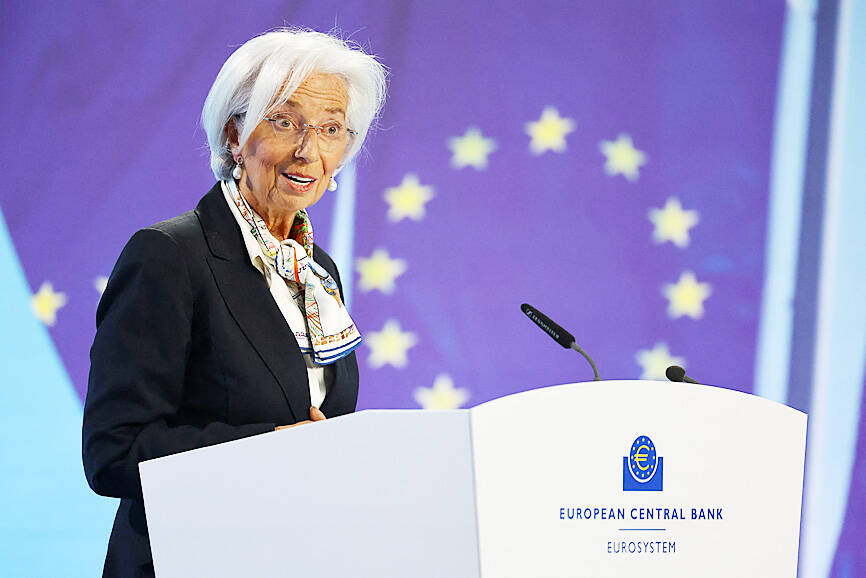The European Central Bank (ECB) froze interest rates again yesterday as it held off from starting to cut borrowing costs amid concerns that sticky inflation is not easing as fast as hoped.
The Frankfurt-based institution’s governing council held the benchmark deposit rate steady at a record four percent for a fourth straight meeting, as widely expected.
"We are making good progress towards our inflation target... but we are not sufficiently confident," ECB President Christine Lagarde told a press conference after the central bank announced its monetary policy decision.

Photo: Kai Pfaffenbach, Reuters
She said "more evidence" was needed that inflation was heading towards the bank's two-percent target, but added that "we will know a lot more in June". Many analysts expect the ECB to begin cutting rates that month.
Policymakers embarked on a historic rate hiking cycle after the costs of everyday goods surged following Russia's invasion of Ukraine and amid the COVID-19 pandemic-related supply chain woes.
"Although most measures of underlying inflation have eased further, domestic price pressures remain high, in part owing to strong growth in wages," the ECB said in a statement.
Inflation, which peaked at over 10 percent in late 2022, has been steadily easing, hitting 2.6 percent last month, heading toward the ECB’s two-percent target.
At the same time, the outlook is bleak, with the eurozone narrowly dodging a technical recession in the second half of last year, weighed down by a poor performance in its biggest economy, Germany.
The ECB yesterday released updated forecasts, with inflation expected to fall faster than previously thought and returning to two percent next year. It also predicted the 20-nation eurozone’s economy would turn in weaker growth this year than previously thought.
Nevertheless, the ECB remains worried about completing the "last mile" to reach its inflation target, prompting it to keep rates at the same level they have been since October last year.
Announcing its latest decision, the bank repeated language seen in recent statements that the "key ECB interest rates are at levels that, maintained for a sufficiently long duration, will make a substantial contribution to" reaching the inflation goal.
Worries about inflation have shifted in recent months from energy costs, which surged after Russia invaded Ukraine in 2022, to inflation in the services sector and wage growth.
"Wage growth remains elevated with little sign of a rapid turnaround yet, fuelling the stickiness in services inflation," Pictet Wealth Management Ltd chief economist Frederik Ducrozet said.
Heightened geopolitical tensions in the Middle East have also added to worries that inflation could rebound. Yemeni rebel attacks on Red Sea shipping have prompted shipping companies to avoid the vital trade route, while a spillover of the Israel-Hamas war could impact oil prices.
The US Federal Reserve, which holds its next rate-setting meeting on March 19-20, is also struggling with when to begin cutting rates, as a series of strong economic readings dim the prospects of early reductions.
While observers are now betting on a first cut in June, they expect the process to move slowly.
"We expect the ECB to ease monetary policy in a gradual fashion, cutting rates by a cumulative 100 (basis points) in 2024," Ducrozet said.

Intel Corp chief executive officer Lip-Bu Tan (陳立武) is expected to meet with Taiwanese suppliers next month in conjunction with the opening of the Computex Taipei trade show, supply chain sources said on Monday. The visit, the first for Tan to Taiwan since assuming his new post last month, would be aimed at enhancing Intel’s ties with suppliers in Taiwan as he attempts to help turn around the struggling US chipmaker, the sources said. Tan is to hold a banquet to celebrate Intel’s 40-year presence in Taiwan before Computex opens on May 20 and invite dozens of Taiwanese suppliers to exchange views

Application-specific integrated circuit designer Faraday Technology Corp (智原) yesterday said that although revenue this quarter would decline 30 percent from last quarter, it retained its full-year forecast of revenue growth of 100 percent. The company attributed the quarterly drop to a slowdown in customers’ production of chips using Faraday’s advanced packaging technology. The company is still confident about its revenue growth this year, given its strong “design-win” — or the projects it won to help customers design their chips, Faraday president Steve Wang (王國雍) told an online earnings conference. “The design-win this year is better than we expected. We believe we will win

Chizuko Kimura has become the first female sushi chef in the world to win a Michelin star, fulfilling a promise she made to her dying husband to continue his legacy. The 54-year-old Japanese chef regained the Michelin star her late husband, Shunei Kimura, won three years ago for their Sushi Shunei restaurant in Paris. For Shunei Kimura, the star was a dream come true. However, the joy was short-lived. He died from cancer just three months later in June 2022. He was 65. The following year, the restaurant in the heart of Montmartre lost its star rating. Chizuko Kimura insisted that the new star is still down

While China’s leaders use their economic and political might to fight US President Donald Trump’s trade war “to the end,” its army of social media soldiers are embarking on a more humorous campaign online. Trump’s tariff blitz has seen Washington and Beijing impose eye-watering duties on imports from the other, fanning a standoff between the economic superpowers that has sparked global recession fears and sent markets into a tailspin. Trump says his policy is a response to years of being “ripped off” by other countries and aims to bring manufacturing to the US, forcing companies to employ US workers. However, China’s online warriors